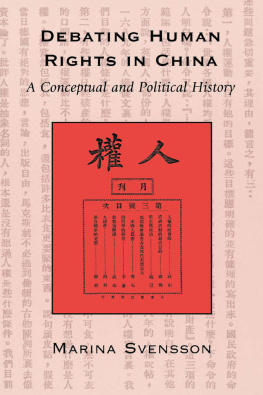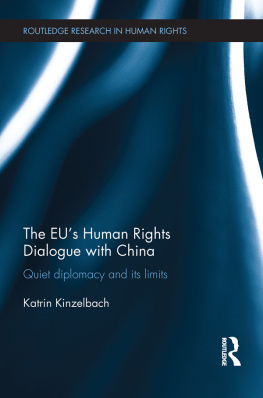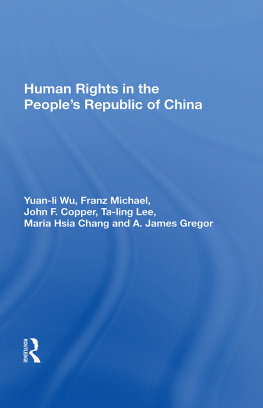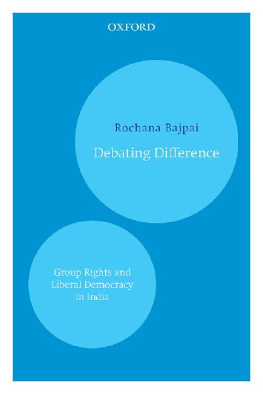Svensson - Debating Human Rights in China
Here you can read online Svensson - Debating Human Rights in China full text of the book (entire story) in english for free. Download pdf and epub, get meaning, cover and reviews about this ebook. City: Maryland, year: 2002, publisher: Rowman & Littlefield Publishers, genre: Politics. Description of the work, (preface) as well as reviews are available. Best literature library LitArk.com created for fans of good reading and offers a wide selection of genres:
Romance novel
Science fiction
Adventure
Detective
Science
History
Home and family
Prose
Art
Politics
Computer
Non-fiction
Religion
Business
Children
Humor
Choose a favorite category and find really read worthwhile books. Enjoy immersion in the world of imagination, feel the emotions of the characters or learn something new for yourself, make an fascinating discovery.
Debating Human Rights in China: summary, description and annotation
We offer to read an annotation, description, summary or preface (depends on what the author of the book "Debating Human Rights in China" wrote himself). If you haven't found the necessary information about the book — write in the comments, we will try to find it.
Debating Human Rights in China — read online for free the complete book (whole text) full work
Below is the text of the book, divided by pages. System saving the place of the last page read, allows you to conveniently read the book "Debating Human Rights in China" online for free, without having to search again every time where you left off. Put a bookmark, and you can go to the page where you finished reading at any time.
Font size:
Interval:
Bookmark:

ROWMAN & LITTLEFIELD PUBLISHERS, INC.
Published in the United States of America
by Rowman & Littlefield Publishers, Inc.
An Imprint of the Rowman & Littlefield Publishing Group
4720 Boston Way, Lanham, Maryland 20706
www.rowmanlittlefield.com
12 Hids Copse Road
Cumnor Hill, Oxford OX2 9JJ, England
Copyright 2002 by Rowman & Littlefield Publishers, Inc.
All rights reserved. No part of this publication may be reproduced, stored in a retrieval system, or transmitted in any form or by any means, electronic, mechanical, photocopying, recording, or otherwise, without the prior permission of the publisher.
British Library Cataloguing in Publication Information Available
Library of Congress Cataloging-in-Publication Data
Svensson, Marina 1961
Debating human rights in China : a conceptual and political history /
Marina Svensson.
p. cm.
Includes bibliographical references and index.
ISBN: 978-0-7425-1697-7
ISBN: 0-7425-1697-0
1. Human rightsChina. I. Title.
JC599.C6 S94 2002
323'.0951dc21
2002001199
Printed in the United States of America
 The paper used in this publication meets the minimum requirements of American National Standard for Information SciencesPermanence of Paper for Printed Library Materials, ANSI/NISO Z.39.48-1992.
The paper used in this publication meets the minimum requirements of American National Standard for Information SciencesPermanence of Paper for Printed Library Materials, ANSI/NISO Z.39.48-1992.
Marina Svenssons book makes a powerful impact not only on our understanding of the history of modern Chinese thought, but on our understanding of a contemporary issue, the so-called Asian values debate. This is the argument over whether human rights ideas are inconsistent with the values of Asian peoples. Since coming under concentrated criticism for its human rights record in 1989, the government of the Peoples Republic of China has mounted a counterattack, supported by other authoritarian Asian regimes and some thinkers East and West, that argues that human rights is a local Western idea without roots in Asia.
Svensson shows to the contrary that sympathetic discussions of human rights have been integral to Chinese thought throughout the modern period, more so than any previous scholar has demonstrated. Not that the authors whose thought Svensson analyzes were unknown until now. They include Chinas best-known modern thinkers. But no one else has brought the human rights themes in their thinking together in one place, to show how intense and continuous their conversation on this topic was across the decades.
The issues that animated Chinese debates over human rights were at bottom no different from those that entered into the Western discourse, which, although older, was also a creature of the modern period rather than a direct outgrowth of the Western tradition. What are the sources of rights? Which of them can be compromised and to what extent? And how should one balance them with the needs of the community? A strong, central set of answers among the many proposed to these questions in China was little different from an influential set of answers in the Westthat human rights grow from human nature, that they are consistent with the ends of the good political community, and that some of them are absolute requirements for human dignity, while others must be balanced off against competing values that also contribute to that dignity.
With so much in common, no one who carefully reads Svenssons evidence can any longer doubt that the Chinese and Western discourses on rights partake of a common universality. Moreover, Svensson is persuasive not only in arguing, but more impressively in demonstrating, that a Westerner can describe the Chinese discourse with objectivity and sympathy.
To be sure, universality does not mean uniformity. Svenssons inquiry produces a rich sense of how the debate took on a particular cast from its embeddedness within the Chinese historical experience. Chinese thinkers faced a constant struggle over locating human rights within what was for many the more pressing claim of national salvation. Given that liberal and democratic forms of government were widely viewed as too ineffective and weak to save the nation, what kind of rights could one expect to enjoy under authoritarian government, and how could the advocate of rights defend their utility not just for the individuals who would enjoy them, but from the viewpoint of the authorities as well? How could the root idea of human dignity be made vivid to a society that lacked a religious tradition based on the idea of individual salvation, and which during much of the time discussed in this book confronted dehumanizing levels of poverty and violence? In a society where most people had more respect for justice than for law, how could rights be given a firmer basis than they could enjoy as mere legal or constitutional enactments? Chinese thinkers addressed all these issues and came up with answers that not only continue to influence the course of Chinese history, but remain worth pondering on their own terms, not only in the West but in the many other societies that are struggling over similar issues in the new century.
By relocating the Chinese human rights discourse away from the periphery and closer to the center of modern Chinese intellectual history, Svensson establishes another, equally important, revision of the conventional wisdom. If the response to the West paradigm has been displaced in the study of Chinese economic and social history, it remains influential in the study of cultural and intellectual history. But Svensson shows that the thinkers she writes about were not pressed into their intellectually painful, and often physically dangerous, inquiries by a desire to comment on remote foreign thinkers. Rather, they were driven to foreign thinkers for wisdom by the urgent need of their own society for guidance on how to face some of the most painful problems of modern politics.
Although carefully translating and studying what the foreign thinkers said, Chinese writers never limited their discussions within the ambit of debating received ideas. They used existing ideas as resources for resolving specific issues they perceived at home. As opposed to a diffusion model of how values change, this supports the idea that human rights principles are generated from within separate modern societies by the intrinsic needs of people living in them. If this is so, then these values validity is truly universal, in the sense that they have sprung up virtually everywhere because of their widespread applicability to the modern condition. If the human rights idea had not already existed, then twentieth-century China would have had to invent it, to defend people whose traditionally rooted sense of human dignity came to be threatened by sweeping economic and social changes, and most of all, by the rise of the modern state. Indeed, in a real sense China did invent the human rights idea, in that Chinese thinkers invented and refined their own version of the idea for their own situation. That the Chinese version proved to have so much in common with the Western one demonstrates the independence of the central human rights concept from cultural differences.
As Svensson brings the story up to the near-present, an irony emerges. In one of the periods when human rights have been most under assault in China, the human rights idea has achieved near-hegemony in Chinese thought. It is not merely the platform of a persistent group of dissidents, not simply the demand of ordinary people who seek human rights in their dealings with authority even though they do not use the term, but also the justification that the ruling party uses in one form or another for its own actionswhether in suppressing deviant religious sects in order to defend the rights of those whom they allegedly manipulate, or in using harsh methods of control in order to better promote development for economic and social rights, or in criticizing American policy abroad that allegedly interferes with the equal rights of other countries. Even the abusers of human rights in practice, in short, cannot hope to legitimize what they do without having recourse to human rights as an idea.
Font size:
Interval:
Bookmark:
Similar books «Debating Human Rights in China»
Look at similar books to Debating Human Rights in China. We have selected literature similar in name and meaning in the hope of providing readers with more options to find new, interesting, not yet read works.
Discussion, reviews of the book Debating Human Rights in China and just readers' own opinions. Leave your comments, write what you think about the work, its meaning or the main characters. Specify what exactly you liked and what you didn't like, and why you think so.








